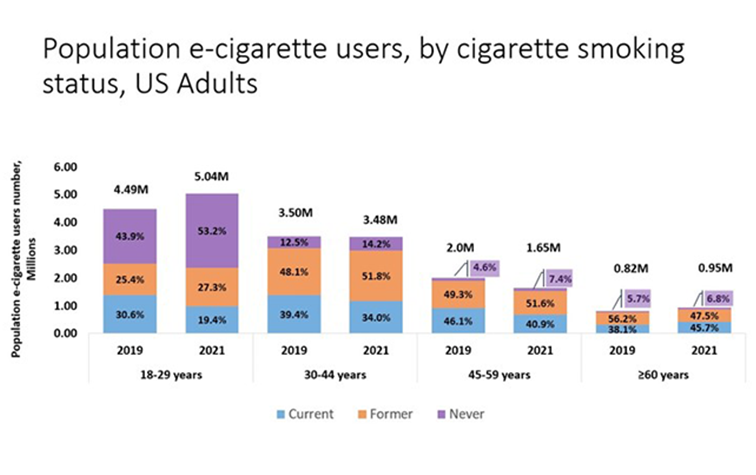Most E-cigarette Users Ages 18 to 29 Never Smoked Before
Researchers say about 2.7 million younger adults with no history of cigarette smoking used e-cigarettes in 2021.
This graphic is from a study about the use of e-cigarettes by adults in the United States between 2019 and 2021 by American Cancer Society researchers and published in the American Journal of Preventive Medicine.

For 18 to 29-year-olds, the purple sections in 2019 and 2021 show that a large percentage of younger adults using e-cigarettes had never used traditional cigarettes. For all the other age ranges, the orange sections for both 2019 and 2021 show that the largest percentages of these populations using e-cigarettes had previously used traditional cigarettes.
The youngest adult group (ages 18 to 29) was the most likely group to use e-cigarettes in 2019 and 2021, and the largest number of users had no history of tobacco use.
In the 18- to 29-year-old section of the graphic:
- Almost 4 and a half million (4.49M) people in this age group used e-cigarettes in 2019 and that number increased to 5.04M in 2021.
- In 2019, 43.9% (about 2 million, as shown by the height of the purple section) used e-cigarettes and had never used traditional cigarettes. In 2021, that proportion increased to 53.2%, or 2.68 million (53.2% x 5.04M). That's an increase of about 710,000 people over 2 years (2.68M - 2M).
Studies have shown that youth and young adults using e-cigarettes have a higher risk for nicotine addiction, respiratory infections (including COVID-19), and progressing to combustible tobacco products. This movement in the wrong direction should spur public health and regulatory agencies, clinicians and health systems, health advocates and others to expand their efforts to accurately communicate the harms of using e-cigarettes to young adults. We don't know the long-term effects of their use."
Priti Bandi, PhD
Scientific Director, Cancer Risk Factors & Screening Surveillance Research
Surveillance & Health Equity Science, American Cancer Society

Most people ages 30 to 60+ who used e-cigarettes in 2021 had previously smoked traditional cigarettes.
In the graphic, in the 3 sections for people ages 30 and older, the bar graphs show that:
- About 6.32 million (3.5+2+0.82 = 6.32M) people across the 3 age groups (30 to 60+) used e-cigarettes in 2019, which was about the same as in 2021, at 6.08 million (3.48+1.65+0.95=6.08).
- About 50% of people in the age groups 30 to 44, 45 to 59, and 60 and older, who used e-cigarettes in both 2019 and 2021 had smoked cigarettes previously and had now quit. In 2021, this translated to about a total of 3.1 million people (as shown by the height of the orange sections).
- Related resources
- For researchers


